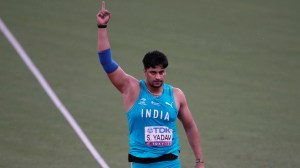Hounded out by media, she can’t prove rape, medical report doesn’t help
This is what police records say, in writing: on June 13, a 32-year-old mother of five children in a UP village walked into the Charthawal po...

This is what police records say, in writing: on June 13, a 32-year-old mother of five children in a UP village walked into the Charthawal police station with her brother to allege that she had been raped by her father-in-law.
Within days, this incident is hijacked by a varied cast of characters: from the BJP to the Congress, the Left to the Samajwadi Party, from the Deoband ulema to the All India Muslim Personal Law Board, from national TV channels to Muzaffarnagar’s Abhi Tak cable station.
And all miss one crucial detail: this woman, Imrana (her name was made public despite a legal bar on identifying an alleged rape victim) will never be able to prove that she was raped—neither before a shariat court nor a criminal court.
For, she alleged rape after local newspapers reported that she had been raped, identified her by name and touched off a feeding frenzy in the media that sucked TV channels into it, not to talk of Muslim clerics in Deoband.
Result: whatever be the truth, one thing is clear: Imrana and her five children—one can neither hear nor speak—may never be able to return home.
Consider the sequence of events that got blurred:
• Imrana’s FIR on June 13 says she was raped ‘‘seven-eight days ago’’
• She says she was told not to go to the police and let the panchayat decide
• She informs her parents and relatives, they come and beat up the father-in-law
• The local press moves in, run stories of the rape and give away her identity; the gram pradhan’s brother runs the local cable TV channel called Abhi Tak
• The police learn of the incident only after it appears in the press, then they approach her
• Imrana’s made to file an FIR, stating that she was told not to approach the police all this while
• The accused, father-in-law Ali Mohammed, is arrested on June 16
• On June 20, the Medical Officer of the Women’s Hospital in Muzaffarnagar signs a report on Imrana’s medical examination, concluding: ‘‘No definite opinion about rape can be given’’
• This medical report, part of police records being compiled by Investigating Officer Kanchan Singh Upadhyaya, will deflate the prosecution case against Ali Mohammed
• Upadhyaya says the considerable delay in reporting the incident means her medical examination will not help establish the rape charge. In short, Ali Mohammed may walk free
And then what happens to Imrana? That question has got lost in the circus that began ever since she alleged rape.
In Charthawal, Imrana’s neighbours are not sure whether she will be able to return.
The semi-pucca house in Noorbafan Mohallah, two lanes behind the police station, is deserted. Locks hang on the doors and neighbours tell you ‘‘Koi nahin hai, sab chale gaye. Bahut badnaami hui, yahan kaise rehate (There’s no one here, they have all left. Their name is mud, how could they live here).’’
The more elderly there, who don’t seem to be opposed to the idea of a shariat court deciding her case, admit it will be very difficult for her: ‘‘In a shariat court, she will need to present four witnesses to the incident. She says it happened in the middle of the night. What will she do?’’
She is already being called a liar. Says neighbour Dr Mohammad Hanif Tyagi. ‘‘It’s basically a property dispute. She and her husband Noor Ilahi wanted to sell this house but her in-laws didn’t want that. She has framed them. Let the case be tried. If Ali is proved guilty, then punish him.’’ But given the medical report on Imrana, chances are Ali may get away.
In Kukra near Muzaffarnagar, where Imrana and her children now live with her parents, brother Abid guards the doorway: ‘‘She can’t meet anyone. She is going through a lot of mental stress. Every day cameras are thrust at our faces, we are shown on TV. It has become a drama.’’
Meanwhile, Deoband’s clerics too are distancing themselves from the controversy over the fatwa issued, annulling Imrana’s marriage.
Darul Uloom’s spokesman Adil Siddiqui says Imrana was never named in the fatwa. According to Siddiqui, a local journalist approached the Nayab Najim of the Fatwa department and asked him if a woman is raped by her father-in-law, does her marriage hold good. To that, the cleric had said no.
Photos



- 01
- 02
- 03
- 04
- 05




























